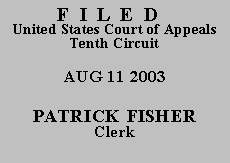

| UNITED STATES OF AMERICA, | No. 03-2007
(D.C. No. CR-01-827-JC) |
Defendant's first argument is that his sentence was improperly calculated. The Presentence Report prepared in Defendant's case determined his base offense level to be 28 based on the net amount of cocaine base attributed to him. (ROA II at 6.) Defendant then received a three-level downward adjustment for acceptance of responsibility. (Id. at 7.) He was also found to have four criminal history points due to his prior convictions. (Id. at 9.) Because those points were based on prior felony convictions for drug trafficking offenses, however, Defendant was determined to be a career offender pursuant to United States Sentencing Guideline § 4B1.1(a) (2001), raising his criminal history category to VI. The applicable Guideline range for Defendant's sentence was therefore 188 to 235 months' imprisonment, and the district court sentenced him to 188 months. (ROA II at 14; ROA IV at 11.)
Defendant's argument is that because the two prior drug trafficking convictions had been consolidated for sentencing purposes by the state court that sentenced him on the same day for both convictions, they should be considered "Related Cases" under U.S.S.G. § 4A1.2, cmt. n.3 (2001). As such, Defendant argues, the two convictions should not have been counted separately for purposes of determining whether Defendant was a "career offender." We reject Defendant's argument as squarely foreclosed by the plain text of the applicable Sentencing Guideline and by applicable precedent. Application Note 3 to U.S.S.G. § 4A1.2 explicitly states, "Prior sentences are not considered related if they were for offenses that were separated by an intervening arrest (i.e., the Defendant is arrested for the first offense prior to committing the second offense)...." In the instant case, Defendant was arrested for the first drug trafficking offense on April 28, 1995; he committed and was arrested for the second offense on July 24, 1995. Thus, according to the plain text of the Guideline, the two offenses cannot be considered related, and the district court did not err in so finding. Moreover, "the fact that the sentences for these two different crimes were imposed by the same [state] court on the same date does not convert these two convictions into related cases within the meaning of U.S.S.G. § 4A1.2 (a)(2)." United States v. Wilson, 41 F.3d 1403, 1405 (10th Cir. 1994).
Defendant's second challenge to his sentence is that the district court erred by not granting him a downward departure pursuant to U.S.S.G. § 4A1.3. We lack jurisdiction to review a district court's refusal to grant a downward departure "[a]bsent the trial court's clear misunderstanding of its discretion to depart, or its imposition of a sentence which violates the law or incorrectly applies the guidelines." United States v. Coddington, 118 F.3d 1439, 1441 (10th Cir. 1997) (internal quotation marks and citation omitted). Here, the record does not support an inference that the district court misunderstood its power to depart downward or that its application of the Guideline was incorrect; rather, the court simply refused to grant the departure. (ROA IV at 10.) Accordingly, we lack jurisdiction to review that decision and reject Defendant's challenge on this ground.
Finally, Defendant cursorily argues (in a mere two sentences in his brief, without supporting citation) that he should have received a three-level downward adjustment to his offense level for being a minor participant in the crime, pursuant to U.S.S.G. § 3B1.2. "A trial court's findings concerning a defendant's role in a particular offense are treated by an appellate court as factual findings, which are subject to deferential review under the clearly erroneous standard." United States v. Santistevan, 39 F.3d 250, 253 (10th Cir. 1994) (internal quotation marks and citation omitted). The district court stated at the sentencing hearing that Defendant was not a minor participant (ROA IV at 7), and nothing in the record leads us to conclude that this finding was clearly erroneous. Moreover, career offenders such as Defendant are not entitled to such an adjustment. United States v. Jeppeson, 333 F.3d 1180, 2003 U.S. App. LEXIS 12612 (10th Cir. June 20, 2003), at *10. Thus, we reject Defendant's challenge to his sentence on this ground.
For the foregoing reasons, we AFFIRM Defendant's sentence.
ENTERED FOR THE COURT
David M. Ebel
Circuit Judge
*.After examining appellant's brief and the appellate record, this panel has determined unanimously that oral argument would not materially assist the determination of this appeal. See Fed. R. App. P. 34(a)(2) and 10th Cir. R. 34.1(G). The case is therefore ordered submitted without oral argument. This Order and Judgment is not binding precedent, except under the doctrines of law of the case, res judicata, and collateral estoppel. The court generally disfavors the citation of orders and judgments; nevertheless, an order and judgment may be cited under the terms and conditions of 10th Cir. R. 36.3.